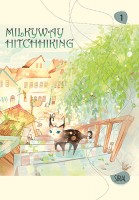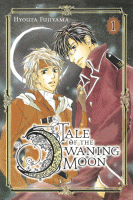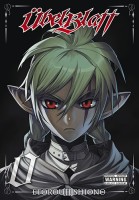My News and Reviews
Happy New Year, everyone! 2015 may now be over, but there is still time to enter Experiments in Manga’s last giveaway of the year for a chance to win Merman in My Tub, Volume 1 by Itokichi; simply tell me a little about your favorite manga released in 2015. As for the first in-depth manga review of the year, that particular honor goes to Tetsu Kariya and Akira Hanasaki’s Oishinbo, A la Carte: The Joy of Rice, which examines the heart and soul of rice in Japanese culture and cuisine. Finally, over the weekend, I posted December’s Bookshelf Overload, the first of what I expect to be many fairly lean months when it comes to book purchases.
Since I’ve been on holiday for the last week or so, I haven’t actually been online much, so I’m certain that I’ve missed out on all sorts of manga news, announcements, and articles. (Please do let me know of any that were particularly exciting!) However, I did come across a few things that made for interesting reading last week. For example, Jonathan Hammill, Tokyo Symphony’s Principal Horn player, wrote about performing and recording music for anime. (I’m a horn player myself, so I found this doubly interesting.) The Shojo Beat tumblr posted the first part of an interview with Arina Tanemura, with the second part to come. And Organization Anti-Social Geniuses has the 2016 update of it’s incredibly useful guide to reading digital manga legally.
Quick Takes
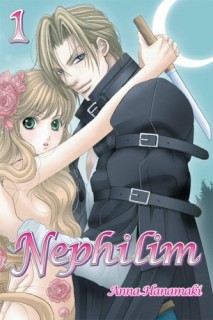 Nephilim, Volumes 1-2 by Anna Hanamaki. It was the basic conceit of Nephilim that first brought the series to my attention. The Nephilim are a race of people who change sex and gender, revealing their true selves at night before transforming again in the morning. Should a human see a Nephilim’s true form, the Nephilim must either kill that human or else die of a curse themselves. (That last bit is apparently too inconvenient from a storytelling standpoint and is soon dropped, however.) When Abel is seen by Guy she is determined to take his life, but that was before she fell in love with him. Now she has a terrible choice to make since a romance between a human and a Nephilim would seem to be doomed from the very start. As far as I can tell, Nephilim was canceled after two volumes; I can’t say that I’m particularly surprised. Despite a vaguely promising start and intriguing worldbuilding, unfortunately the series ends up being a confusing, nonsensical mess with hardly a likeable character in it, somehow managing to become more and more cliche as unfolds even while incorporating unique elements. The artwork could be pretty at times, though.
Nephilim, Volumes 1-2 by Anna Hanamaki. It was the basic conceit of Nephilim that first brought the series to my attention. The Nephilim are a race of people who change sex and gender, revealing their true selves at night before transforming again in the morning. Should a human see a Nephilim’s true form, the Nephilim must either kill that human or else die of a curse themselves. (That last bit is apparently too inconvenient from a storytelling standpoint and is soon dropped, however.) When Abel is seen by Guy she is determined to take his life, but that was before she fell in love with him. Now she has a terrible choice to make since a romance between a human and a Nephilim would seem to be doomed from the very start. As far as I can tell, Nephilim was canceled after two volumes; I can’t say that I’m particularly surprised. Despite a vaguely promising start and intriguing worldbuilding, unfortunately the series ends up being a confusing, nonsensical mess with hardly a likeable character in it, somehow managing to become more and more cliche as unfolds even while incorporating unique elements. The artwork could be pretty at times, though.
 One-Punch Man, Volumes 1-3 written by One and illustrated by Yusuke Murata. For over a year, most of One-Punch man was only available in English digitally; it was only recently that it was finally released in print. I had been holding out, so I was glad when I could finally hold the series in my hand. I have been hearing great things about One-Punch Man since it first began and I was sincerely afraid that I would be disappointed when I read it. I was very happy to discover that the series lives up to its reputation. Both the writing and the artwork are excellent. The premise of One-Punch Man is that Saitama, at one point a miserable salaryman, has taken his hero training so far that he can now defeat any enemy with a single punch, once again leaving him bored and frustrated with life. He’s actually more worried about missing bargain days at the supermarket than he is about dying in battle. One-Punch Man is legitimately funny and the fight and action sequences are great. I’m actually rather impressed by how many different scenarios One has come up with for what could have been a very limited, one-shot joke.
One-Punch Man, Volumes 1-3 written by One and illustrated by Yusuke Murata. For over a year, most of One-Punch man was only available in English digitally; it was only recently that it was finally released in print. I had been holding out, so I was glad when I could finally hold the series in my hand. I have been hearing great things about One-Punch Man since it first began and I was sincerely afraid that I would be disappointed when I read it. I was very happy to discover that the series lives up to its reputation. Both the writing and the artwork are excellent. The premise of One-Punch Man is that Saitama, at one point a miserable salaryman, has taken his hero training so far that he can now defeat any enemy with a single punch, once again leaving him bored and frustrated with life. He’s actually more worried about missing bargain days at the supermarket than he is about dying in battle. One-Punch Man is legitimately funny and the fight and action sequences are great. I’m actually rather impressed by how many different scenarios One has come up with for what could have been a very limited, one-shot joke.
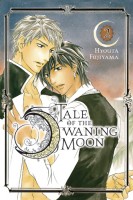 Tale of the Waning Moon, Volumes 2-4 by Hyouta Fujiyama. The first volume of Tale of the Waning Moon amused and entertained me, so I figured that I should read the rest of the short boys’ love series. The manga continues to be utterly ridiculous, although by the end it has become surprisingly weighty. In the beginning, the plot progression of Tale of the Waning Moon is highly influenced by role-playing games, complete with random old men giving clues as to what needs to be done next (I love this) and multiple side quests that must be completed before the main goal can be achieved. The goal in this case being uniting Ryuka with Ixto, one of the spirits of the Moon. The RPG elements become less prominent as the series develops although the fantasy setting remains. I generally preferred the goofier side of Tale of the Waning Moon; some of the more serious developments actually felt a little out-of-place and less convincing than the series’ comedy and silliness. But I did enjoy the manga overall. Though it had a dubious start, Ryuka and Ixto’s relationship is sincere in the end. I did, however, find that I was often more invested in the supporting cast and couples.
Tale of the Waning Moon, Volumes 2-4 by Hyouta Fujiyama. The first volume of Tale of the Waning Moon amused and entertained me, so I figured that I should read the rest of the short boys’ love series. The manga continues to be utterly ridiculous, although by the end it has become surprisingly weighty. In the beginning, the plot progression of Tale of the Waning Moon is highly influenced by role-playing games, complete with random old men giving clues as to what needs to be done next (I love this) and multiple side quests that must be completed before the main goal can be achieved. The goal in this case being uniting Ryuka with Ixto, one of the spirits of the Moon. The RPG elements become less prominent as the series develops although the fantasy setting remains. I generally preferred the goofier side of Tale of the Waning Moon; some of the more serious developments actually felt a little out-of-place and less convincing than the series’ comedy and silliness. But I did enjoy the manga overall. Though it had a dubious start, Ryuka and Ixto’s relationship is sincere in the end. I did, however, find that I was often more invested in the supporting cast and couples.


